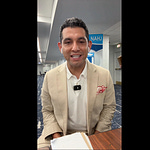A federal insider reveals how ICE agents are operating with fewer restraints, escalating fear and suspicion on the streets—and stoking a decades-old identity war.
By Nick Valencia
LOS ANGELES — When I called a longtime federal source this week, I didn’t know what I’d hear. I just knew what I’d seen: a blown-out wall in Huntington Park and neighbors too scared to speak.
It didn’t feel like law enforcement. It felt like something else.
“I don’t know what it is,” the source told me. “But these guys are being told there’s no strings attached anymore. Go do your job. Go forward.”
This is a person with deep knowledge of federal immigration operations. They agreed to speak on a condition of anonymity.
“They’re militarizing the streets”
According to the source, from Pomona to Bell to the heart of Huntington Park, what’s unfolding in Los Angeles is not just a series of targeted raids. It's the result of a new mandate—one that blends decades-old conservative identity politics with modern enforcement tools.
“They think they’re going after sex traffickers or pedophiles—serious offenders,” the source said of the mindset of some federal agents.
And some of them feel righteous about it. But when it trickles down to the streets, who’s getting picked up as well? The taco guy. The street vendor.
My source said it comes down to the duality of the agency.
"They have to enforce the law," the source said.
The source confirmed that many agents are aware of the optics—and they don’t care.
“There’s agency fatigue,” he said. “They’ve been told for the first time, go forward. No oversight. No consequences. Just do it.”
The Facial Recognition Fog
Social media is flooded with videos of agents snapping photos of bystanders and people filming them. Is this just intimidation? Or are we being cataloged for future prosecution?
I asked directly: Are they using facial recognition on protestors, journalists, street witnesses?
The answer? “Not in the way you think.” The source explained that the infrastructure just isn’t fully in place—not yet. But there’s fear of what’s next.
“Body-worn cameras are the bigger issue,” the source said. “The fear is that they’ll eventually be used to build models—real-time surveillance systems. That’s the roadmap.”
But even now, something’s shifting. “Some of those guys, they’re making $57,000 a year,” he told me. “And they see their photo online, they’re getting doxxed. So they snap a photo back. It’s not always official. Sometimes it’s just personal. A middle finger.”
While claims of widespread doxxing have been made by government officials, there have been limited examples. Community organizers and critics have pushed back on the claims, alleging that it’s an official government line used to circumvent public safety.
President Trump and The Miller Doctrine
President Trump is "clearly open to feedback,” on immigration the source said. “He knows hotels, restaurants, and the service industry can’t function without immigrant labor. I’ve heard that message loud and clear.”
But while Trump listens to business interests, Trump immigration architect Stephen Miller has been waging what the source called an “identity war”—one that began during the Reagan era in California.
When I pressed the source for why this is happening now, the conversation drifted to the ideology shaping the crackdown.
“This is Miller’s blueprint,” the source said. "English-only. A fear of identity loss."
“This has been a growing panic population over the last 20 years, like it or not,” the source said. “Movements like English as the official language pop up more frequently now.”
It’s rooted in Prop 187. Something Miller was a student for in Santa Monica during the massive school walkouts led predominately by Latino students. It was a foundational moment for him.
“Always identity panic. It’s not new,” he said. “But Miller… he’s found a way to make that panic policy.”
As for Trump listening to the farm and hotel lobby? Just north of Los Angeles in Ventura County, farms in Oxnard continue to be raided. While in the Central Valley, undocumented labor on farms in deeply held red counties have been virtually untouched.
A Promise Kept?
What makes this crackdown different is that it's not just about border control or crime prevention. It’s about politics. About power. About sending a message that some people—no matter how long they’ve lived here—will never belong.
At the heart of it is President Donald Trump.
“He made a promise to deport people. He’s trying to keep it,” the source said.
And while Trump may bend to business, Stephen Miller doesn’t.
So the enforcement blitz we’re seeing now might not just be about border crossings or even public safety. It might be about symbolic targets—high-visibility arrests that signal strength while sidestepping corporate blowback.
It's bad to over promise and under deliver. So now we're seeing a city under siege not by terrorists or criminals, but by a policy turned loose without brakes.












Share this post